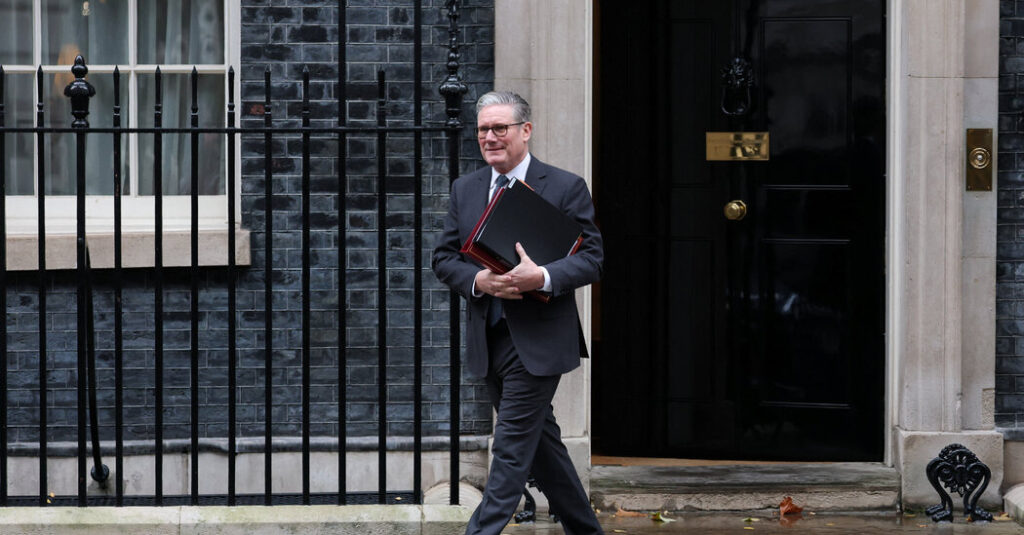The British government announced plans on Thursday to extend the time required for legal immigrants to be granted permanent residency, saying foreign workers would have to “earn” the right to remain in the country indefinitely.
The proposals are part of a tightening of immigration rules under the center-left Labour government as it tries to counter the rise of Reform U.K., a right-wing populist party that has put cutting immigration at the heart of its identity.
Here’s what to know.
How would the rules for legal immigrants change?
Under the current system, most people who come to Britain legally can apply for permanent residency, also known as “settled status,” after five years of living and working in the country.
Settled status — which is roughly similar to having a green card in the United States — allows people to study or work in any job. It also grants expanded access to welfare payments.
It also allows people to bring some family members to join them, grants their children citizenship at birth and allows people to apply for British citizenship themselves a year after being granted permission to stay indefinitely.
Announcing the policy in Parliament on Thursday, Shabana Mahmood, the home secretary, said that the government would raise the default qualifying period for permanent residency to 10 years from five. The amount could vary, she said, based on how much an immigrant was “contributing to society.”
“To settle in this country forever is not a right but a privilege, and it must be earned,” Ms. Mahmood said.
The government has opened a 12-week “consultation” period in which individuals and groups may submit feedback and concerns. This is a normal process in British policymaking and usually results in only minor amendments to proposals.
Who would benefit from the new rules?
Broadly, the immigrants who make the most money; people with senior public-service jobs, such as doctors; and those with “global talent” visas for specialized industries.
Legal immigrants who pay the highest tax rate in Britain — meaning they earn at least 125,140 pounds a year, or about $163,700 — would have a faster route to permanent residency. They would be able to apply for permanent residency after three years instead of five.
People paying the second-highest tax rate, meaning they earn at least £50,270 a year, could still apply after five years, as could those in certain public-service sectors such as health or education.
The government said that the parents, partners or children of British citizens could still apply for permanent residency after five years, as could Hong Kongers who came on the British National Overseas visa that was created in 2021 in response to a new security law imposed by China.
Who would lose out?
The new system would penalize lower-paid workers, immigrants who claim welfare or other state benefits in Britain and people who don’t speak English well.
To even qualify for permanent residency, immigrants would need to be paid more than £12,570 (about $16,400) a year for at least three years; know English to a “high standard”; owe no money to the British government through, for example, unpaid taxes; and have no criminal record. (Average annual earnings in Britain are about £38,000.)
While the default wait time for permanent residency would be raised to 10 years, the proposals would lengthen it even further for people deemed “noncompliant” with British rules and laws or to have made a “negative contribution” since arriving.
That would include entering Britain through an illegal route, such as on a small boat crossing the English Channel; overstaying a visa; or claiming benefits.
The government is proposing to extend the waiting period for permanent residency by up to 20 years in those cases, meaning some people would have to live in Britain for 30 years before qualifying.
Why is the government making these changes?
Thursday’s proposal was the latest in a series of announcements from the government of Prime Minister Keir Starmer aimed at showcasing a tougher approach to immigration.
Ms. Mahmood blamed previous Conservative governments for overseeing a significant increase in net migration since 2021 — particularly by easing requirements for a health and care-worker visa on which more than 600,000 workers and their family members arrived between 2022 and 2024.
“The pace and scale of migration in this country has been destabilizing,” Ms. Mahmood said. “I worry that for some, that broad patriotism is narrowing, and that a vision of a greater Britain is giving way to that of a littler England, as anger turns to hate.”
Critics of the government have argued that other factors, such as social media, have contributed to the rise of anti-immigrant sentiment. Some economists have also warned that net immigration levels to Britain are already falling rapidly and that industries may face hiring issues as a result.
When would the new rules take effect?
Ms. Mahmood said that because most of the changes could be made by altering existing rules rather than by introducing new laws, she expected them to come into force in April 2026.
The post Want to Immigrate to Britain? The Government Says You Must Earn It. appeared first on New York Times.




